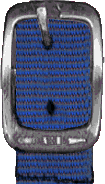
 |
Family K9 -Training Tips & Helpful Hints |

"BARK", April 1987
GROWING YOUR PUPPY By Budd Riddle Between six weeks and five months is a very important period for the proper growth and general socialization of your new puppy. Anything that a dog learns in this period will have a direct effect on the rest of his life. With this in mind, it will serve as a general guide for dog owners with puppies that are too young to formally train in obedience, but still need help and guidance in this crucial period. Whatever the age of your puppy, you may apply these principles with direct application of the dog's current age. At six to ten weeks put Fido on a schedule. Generally feed him three times a day. DO NOT LEAVE FOOD IN FRONT OF FIDO ALL THE TIME as it makes it too difficult to determine when a bowel movement will take place. Also, dogs that have access to food all the time become picky eaters later on, and may experience nutritional or weight problems. Scheduled feeding times aid in house breaking. Elimination follows within one hour after eating. Knowing this, after the dog has finished eating (usually 15-20 minutes later), take your dog outside and play with him until a bowel movement takes place. Use a consistent phrase when Fido does his business. "Take a break", "Free time" or whatever, then praise, "Good dog!" will help later (in training) when you give your dog a break from a training session. This is called "elimination on command". If you work all day and cannot supervise Fido, you may want to feed him twice a day, giving slightly more food per feeding. A High-Pro dog food is best, with a pet tab or calcium tablet, as your Vet recommends. Do not over feed your pet. Also start your pup on a heartworm preventative at this time. If you keep your dog in the house, get a Sky-Kennel or a holding cage for nighttime or other unsupervised times. A dog does not like to soil the area where he sleeps. It is not inhumane to confine a puppy. Better to confine him than to beat him for an accident on the carpet that occurred while you slept. This also has good results with a grown dog that has problems with house breaking or chewing (usually at 10-12 weeks). During this time Fido's main problem may be chewing, jumping, digging or running away. These problems are easier to solve when they start, than after they become habit. Chewing-- Channel your dogs chewing as puppies HAVE TO CHEW. Give your puppy a quality chew toy that will not shred or break. Many people use rawhide chew bones. These rawhide chew bones are fine as long as the puppy can chew, but NOT CONSUME as intestinal blockage could result. So give him a chew toy at quiet times, at night or other times of confinement. Do not use chew toys during playtime. Jumping-- Usually too much petting or too little attention starts this habit. Refuse to pet your dog until he sits. Gently but firmly, push down on the hind quarters, say "Fido, Sit", then praise and pet him. Hitting, kicking or yelling will have an adverse affect on a puppy. COMMUNICATE with the dog. Talk quietly, do not lose your temper, but be firm. All this is "puppy socialization", and you may do it yourself in two fifteen minute periods a day. Playtime-- After eating play with Fido. Channel him into playing with a ball. Avoid pull toys (Tug-O-War) and play that involves the dog putting his mouth on you. You may regret it later on. Digging-- Provide supervision when your dog is in the yard. A dog left alone in a yard will start digging initially, to reach the cool dirt and be comfortable. Provide a well-insulated dog house for Fido, use "Repelzit" or a similar product in flower beds or other loose dirt areas. Make your dog an enjoyable asset, a good canine citizen. Get Fido trained. |

 TM
TM